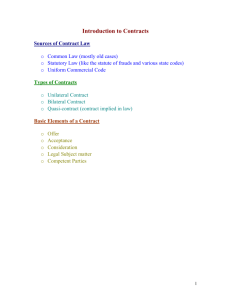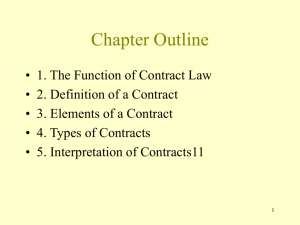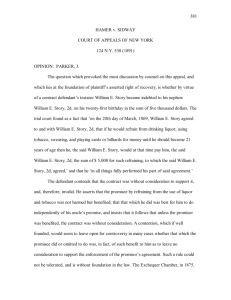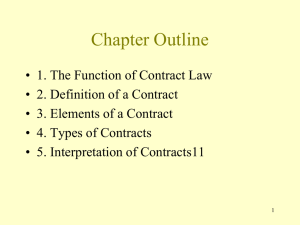Introduction to Contract Law: Key Concepts & Types
advertisement
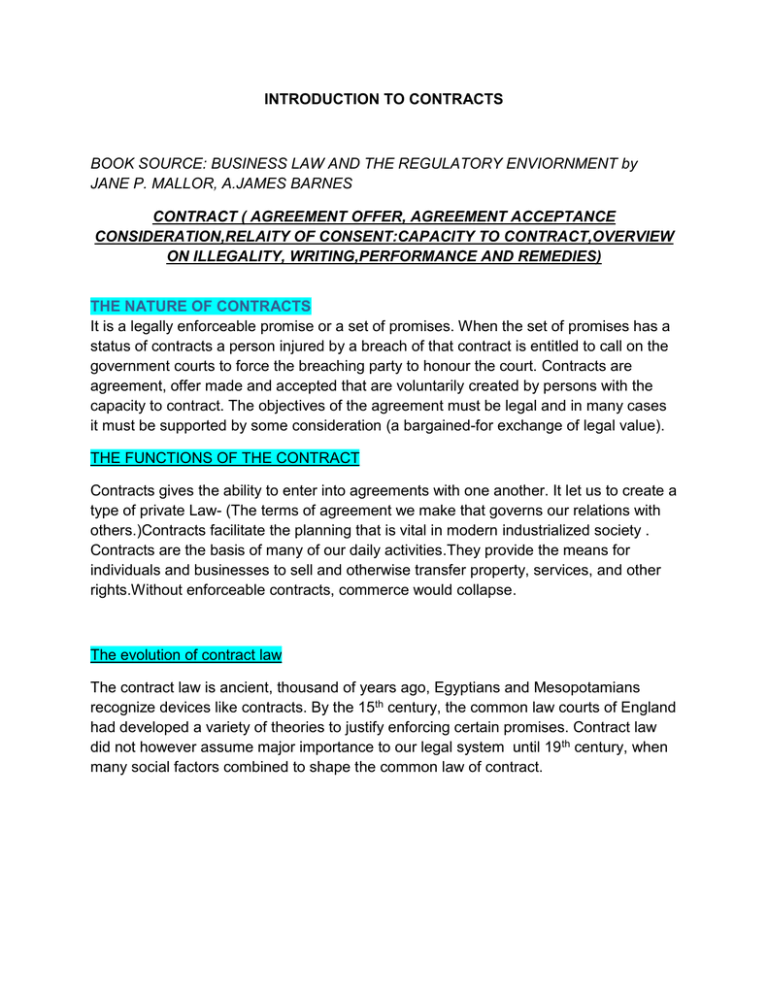
INTRODUCTION TO CONTRACTS BOOK SOURCE: BUSINESS LAW AND THE REGULATORY ENVIORNMENT by JANE P. MALLOR, A.JAMES BARNES CONTRACT ( AGREEMENT OFFER, AGREEMENT ACCEPTANCE CONSIDERATION,RELAITY OF CONSENT:CAPACITY TO CONTRACT,OVERVIEW ON ILLEGALITY, WRITING,PERFORMANCE AND REMEDIES) THE NATURE OF CONTRACTS It is a legally enforceable promise or a set of promises. When the set of promises has a status of contracts a person injured by a breach of that contract is entitled to call on the government courts to force the breaching party to honour the court. Contracts are agreement, offer made and accepted that are voluntarily created by persons with the capacity to contract. The objectives of the agreement must be legal and in many cases it must be supported by some consideration (a bargained-for exchange of legal value). THE FUNCTIONS OF THE CONTRACT Contracts gives the ability to enter into agreements with one another. It let us to create a type of private Law- (The terms of agreement we make that governs our relations with others.)Contracts facilitate the planning that is vital in modern industrialized society . Contracts are the basis of many of our daily activities.They provide the means for individuals and businesses to sell and otherwise transfer property, services, and other rights.Without enforceable contracts, commerce would collapse. The evolution of contract law The contract law is ancient, thousand of years ago, Egyptians and Mesopotamians recognize devices like contracts. By the 15th century, the common law courts of England had developed a variety of theories to justify enforcing certain promises. Contract law did not however assume major importance to our legal system until 19 th century, when many social factors combined to shape the common law of contract. During 20th century there was a dramatic increase in government regulation of private contractual relationship. For example employment contracts are governed by host of law concerning maximum hours of work , mini,I, wage rate, employer liabilities for on the job injuries etc. The main purpose of much of these regulation is to protect persons who lack sufficient bargaining power to protect themselves.Despite of the increased attention to the fariness in contract law the agreement between the parties is still the heart of the contract THE METHODS OF CONTRACTING Usually the contracts should be written but there are some contracts which are oral and are valid. STANDARIZED FORM CONTRACTS: they are contracts that are pre-printed by one party and re presented to the other party for signing . The party who drafts and writes the contract usually have more bargaining power .The terms of standardized contract are non-negotiable. These types of standardized contracts are common online as well as physical world. For example when you are downloading any software from the internet you enter into the contract while accepting there terms and conditions, like when you click on “I agree” icon. These kinds of contracts are called CLICK WRAP CONTRACT. Or CLICK THROUGH CONTRACTS. There is one more type which is called SHRINK WRAP LICENCES, Or SHRINK WRAP CONTRACTS which means that practice of sealing the software in shrink wrapped packaging. BASIC CONTRACT CONCEPTS AND TYPES. Contracts are classified as bilateral and unilateral contracts. Unilateral contract One party makes a promise for example DR CAFÉ issues “ Frequent Buyer “ Card to its customers., and it stamps each time when a customer buys coffee. Dr Café promises to give any customer a free cup of coffee if he buys 10 cups of coffee and his frequent buyer card is stamped 10 times. This means that DR CAFÉ entered in a UNILATERAL (one way ) CONTRACT where the agreement will be only once the customer buys the frequent buyer card. Bilateral Contract when both the parties are exchanging promises and the contract is formed. For example a promise between a landlord and a tenant. VALID, UNENFORCEBLE, VOIDABLE AND VOID CONTRACTS. A Valid Contract is one that meets all of the legal requirements for a binding contracts. Therefore these are enforceable in court of law. An unenforceable contract is one that meets the basic legal requirement but is not enforceable in court of law due to some legal rule. For example the contract is one of those for which the statutes of frauds requires a writing but no writing is made the contract is said to be unenforceable Voidable Contracts are those in which one or more of the parties have the legal right to cancel their obligation under the contract. The injured party has the right to cancel the contract if he chooses. That right belongs only to the injured party and if he doesnot cancel the contract it can be enforced by either party. VOID CONTRACTS. They are agreement that creates no legal obligations and for which no remedy will be given, contracts to commit crimes such as “hit” contracts , are classic examples of void contracts. EXPRESS AND IMPLIED CONTRACTS. In an express contract the parties have directly stated the terms of their contract orally or in writing at the time the contract was formed however the mutual agreement necessary to create a contract may also be demonstrated by the conduct of the party. When the surrounding facts and the circumstances indicate that an agreement has infact been reached, an implied contract (also called a contract implied in fact) has been created. For example when you go to a doctor for treatment…… etc. EXCECUTED AND EXECUTORY CONTRACTS A contract is executed when all of the parties have fully performed their contractual duties and it is executory until such duties have been fully performed . Any contract may be described using one or more of the above terms for example EURO CARS INC orders 5 new Mercedes BENZ 500 SLs from Mercedes . Mercedes sends EURO CARS Its standard acknowledgement form accepting the order. The parties have a valid express, bilateral contract that will be excutoery until Mercedes delivers the cars and euro cars pays for them “NON CONTRACT” OBLIGATION Although contract obligation normally require mutual agreement and an exchange of value there are some circumstances in which the law enforces an obligation to pay for certain losses or benefits even in the absence of mutual agreement and exchange of value. This is called as NON CONTRACT OBLIGATIONS because they impose their duty on a person to pay for a loss or benefit yet they donot make this criteria for formation of a contract. These non-contract doctrines give a person who cannot establish the existence of a contract a chance to obtain compensation. “QUASI CONTRACTS” Requiring all the elements of a binding contract before contractual obligation is imposed can cause injustice in some cases, One person may have provided goods or services to another person who benefited from them but has no contractual obligation to pay for them because no facts exists that would justify a court in implying a promise to pay for them. Such a situation can also arise in case where the parties have contemplated entering into a binding contract but some legal defense exist that prevents the enforcement of the agreement . FOR EXAMPLE. CASE Johns paints smith house by mistake thinking it belongs to reed, smith knows that johns is painting his house but doesnot inform him of his error. There are no facts from which a court can refer that. John and smith have a contract because the parties had no prior discussion or dealing. Thomas products fraudulently induces perkins to buy a household products franchised by Grossly , mis-stating the average revenues of its franchisees. Perkins discovers the misrepresentation after he has resold some products that he has received but before he has paid Thomas for them. Perkins elects to rescind (Cancel) the franchise cancel contract on the basis of the fraud. In the proceeding example both smith and perkins have good defenses to contract liability; however , enabling smith to get a free paint job and perkins to avoid paying for the goods he resold would unjustly enrich them at the expense of john and thomas. To deal with such cases and to prevent such unjust enrichments the courts imply as the matter of law a promise by the benefited party to pay the reasonable value of the benefits he receives. This idea is called the QUASI CONTRACT or CONTRACT IMPLIED in law. PROMISSORY ESTOPPEL. Another very important idea that courts have developed to deal with unfairness that would sometimes result from the strict application of traditional contract principles is the doctrines of promissory estopel. In numerous situation one person may rely on a promise made by another even though the promise and surrounding circumstances are not sufficient to justify the conclusion that a contract has been created because one or more of the required elements is missing. To allow the person who made such a promise (promisor) to argue that no contract was created would sometimes work an injustice on the person who relied on the promise(the promise) . In Ricketts VS Scothorn a grandfather promise to pay his grand daughter interest on a demand note he gave her so that she would not have to work was enforced against him after she had quit her job in reliance on his promise. The Nebraska supreme court acknowledged that such promises were traditionally unenforceable because they were gratuitous and not supported by any consideration but held that the grand daughter reliance prevented her grandfather from raising his lack of consideration defense UNIFORM COMMERCIAL CODE This was by American LAW institute and the national conference on uniform states Law . The purpose is to establish the uniform set of rules to govern commercial transaction . It has 9 articles. Article 2 deals with the sale of Good. PART 2 AGREEMENT OFFER WHAT IS AN OFFER? This is the first step in the contract formation process. The person who makes the Offer is called the OFFEROR, and the person to whom the offer is being made is called OFFEREE. Court will term only that offer as an contract which fulfills these three requirements 1. Present intent to contract 2. Specificity or definiteness 3. Communicated to the offeree. TERMINATION OF OFFER 1. Terms of the offer should be clear for example this offer is valid for five days now court will see whether that started the day the offer Is sent or when the offeree receives it. 2. Lapse of time offer that fails to specify time for acceptance means they are Valid for reasonable time. Offers involving things subjects to rapid fluctuations in value like stocks, bond have a brief duration. 3. Revocation: Offers are revocable. Offeror can revoke his offer any time before the acceptance by the offeree, even if they stated that they will hold the offer open for stated period of time However there are some exceptions in the above mentioned rule as well 4. Rejection: An offeree may expressly reject an offer by indicating that he is unwilling to accept it. He may also reject it by making a counterfeit offer. Either form of rejection by the offeree terminates his power to accept the offer. 5. Death of insanity of either party: The death or insanity of either party automatically terminates the contract without any notice. 6. Destruction of subject matter: if prior to the acceptance of the offer , the subject matter of the proposed contract is destroyed without the knowledge or fault of either party the offer is terminated. 7. Intervening illegality: an offer Is illegal if the performance of the contract it propses becomes illegal before the offer is accepted. PART 3 AGREEMENT ACCEPTENCE The Acceptance is “a manifestation of assent to the terms(of the offer) made by the offeree in the manner invited or required by the offer. In determining if an offeree accepted the offer and created a contract a court will look for evidence of three factors : 1. The oferee intended to enter the contract. 2. The Offeree accepted on the terms proposed by the offereor. 3. The offeree communicated his acceptance to the offeror. PART 4 CONSIDERATION A common definition of consideration is “ legal value bargained for and given in exchange for an act or a promise. A person who makes the promise is called a PROMISOR , The person whom promise was made PROMISEE. The promise generally cannot be enforced against the person who made it promisor unless the person to whom the promise was made Promisee has given up something of legal value in exchange for the promise. THE ELEMENTS OF CONSIDERATIONS NO HAS THE PROMISEE GIVEN THE LEGAL VALUE WAS EHAT THE PROMISEE GAVE THE “price” OF THE PROMISORS PROMISE? NO NO CONSIDERATION CONSIDERATIONS EXPLAINATION An act or promise can have legal value in two or more ways, If an exchange for the promisor promise the promisee does , or agrees to do , something he has no prior duty to o, that provides legal value If an exchange for the promisors promise , the promisee refrains from doing so, something that a promise has a legal right to do Case , HAMER VS SIDWAY An uncle promise to pay his nephew $5000, if he refrained from using tobacco, drinking , swearing and playing cards for money until he turns 21st birthday, held to be supported by consideration. indeed the nephew had refrained from doing any of these act, even though he may have benefited from doing so refraining. He had a legal right to indulge in such activities, yet he had refrained from doing so at his uncle request and in exchange for his uncles promise. This was all that was required for consideration CONSIDERATION NON CONSIDERATION Doing something you had no pre-existing duty to do Doing something you had a pre-existing duty to do Promising to do something you had no preexisting duty to do . Promising to do something you had a preexisting duty to do so. PART 5 REALITY OF CONSENT In some situations there are compelling reasons for permitting people to escape or avoid their contracts. All such contracts which are obtained by under mentioned conditioned are called VOIDABLE An agreement obtained by. 1. Misrepresentation and Fraud It is an assertion that is not in accord with the truth. Misrepresentation can either be innocent or committed knowingly (FRAUD) the contract becomes VOIDABLE in court that Is the injured party can Rescind (cancel) it. 2. Mistake It means that anyone who enters the contract on the basis of his understanding of the facts that are relevant to the contract. CASE Fox contracts to sell to Ward a half carat stone which both believe to be a tourmaline, at a price of $65. If they are wrong and the stone is diamond worth $2500, Fox will have suffered an unexpected loss and ward will have reaped an unexpected gain. In this case the person affected by the mistake can avoid the contract under the doctrine of mistake. 3. Duress It means a wrongful coercion that includes a person to enter a contract. Common type of duress are threats of physical , emotional or economic harm CASE JOHN overpowers ADAM , grasps his hand, and forces him to sign a contract.This kind of contract is VOID. 4. Undue influence It is unfair persuasion, here the pressure is by forcing someone not by coercion but by persuasion.large proportions of undue influence cases arise after the death of person who has been the subject of undue influence, when his relatives seek to set aside that person’s contract or wills. PART 6 CAPACITY TO CONTRACT Capacity means the ability to incur legal obligations and acquire legal rights. Primary classes of people who are considered to lack capacity are minors known as infant, persons suffering from mental illnesses or defects and intoxicated persons. Contract law allows them to avoid escape the contract that they enter during incapacity. Exceptions to the minor’s right to disaffirm . Not all contracts involving minors is voidable, however state law often creates statutory exceptions to the minor’s right to disaffirm(avoid the contract) example marriage, agreement to support their children, educational loans, life and medical insurance, contract to employ a child actor etc. PART 7 PERFORMANCE AND REMEDIES. When a promisor has performed his duties under a contract, he is discharged. In determining whether a promisor is discharged by performance and whether the constructive condition of his performance has been fulfilled, courts may consider the standard of performance which is expected of him. When a person’s performance is due any failure to perform that is not excused is a breach of contract.


